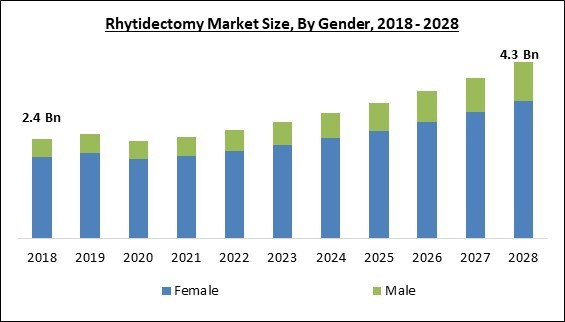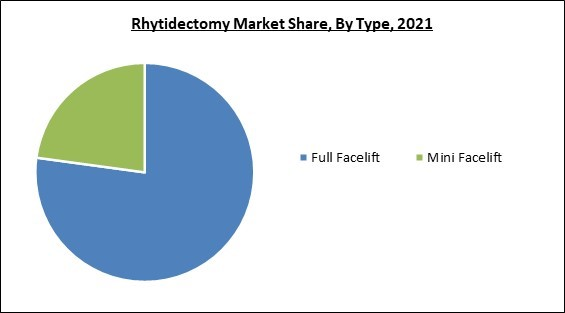The Global Rhytidectomy Market size is expected to reach $4.3 billion by 2028, rising at a market growth of 8.4% CAGR during the forecast period.
Rhytidectomyis a cosmetic procedure used to remove extra facial skin, redrape the skin, tone the facial muscles, and tighten the underlying tissuesto give the patient a more youthful appearance. Rhytidectomy is more commonly referred to as a facelift. The fundamental urge to remain young is a major factor propelling the worldwide rhytidectomy market. Rhytidectomy ranks as the sixth most popular cosmetic operation, behind breast augmentation, liposuction, abdominoplasty, eyelid surgery,and breast lift, as stated by theAmerican Society for Aesthetic Plastic Surgery.
The rhytidectomy marketis extremely sensitive to various social and cultural issues, as well as the media's and the fashion industry's impact, peer pressure for attractiveness, and shifting definitions of beauty, amongst many others. The marketis driven by the rise in elderly people, particularly the baby boomer generation. A skin flap on each face side is pulled back during a rhytidectomy orfacelift. In addition to removing extra skin, tissues beneath the skin are changed. This shapes the face to look younger.
Frequently, a facelift includes a neck lift. On the neck, it minimizes fat and sagging skin. As people age, their faces alter in appearance and structure. Skin starts to sag and doesn't recover as quickly. Some parts of the face's fat deposits decrease, while others see an increase. Some commonage-related changes thatcan be addressed with a facelift include cheeks that appear to be sagging, the lower jawline's extra skin, and deep skin folds extending from the mouth’s corners to the nose’s sides.
Most of the demand for rhytidectomy arises in nations that are majorly known for medical tourism. Therefore, the tourism industry has a share that is out of proportion to its size. For instance, due to their robust tourism industries, tourist hotspots like Miami, Pattaya, Bangkok, and Venezuela perform disproportionately high facelift operations. More FDA approvals are fueling the growth and expansion of the rhytidectomy market. Additionally, the U.S. FDA's approval of fibrin sealants and the appearance of healing creams have further bolstered demand.
The market research report covers the analysis of key stake holders of the market. Key companies profiled in the report include London Bridge Plastic Surgery, Piedmont Plastic Surgery & Dermatology, The Plastic Surgery Center, USA Health, ASET Hospital, Enhance Medical Group and BSR ENT Hospital.
Rhytidectomyis a cosmetic procedure used to remove extra facial skin, redrape the skin, tone the facial muscles, and tighten the underlying tissuesto give the patient a more youthful appearance. Rhytidectomy is more commonly referred to as a facelift. The fundamental urge to remain young is a major factor propelling the worldwide rhytidectomy market. Rhytidectomy ranks as the sixth most popular cosmetic operation, behind breast augmentation, liposuction, abdominoplasty, eyelid surgery,and breast lift, as stated by theAmerican Society for Aesthetic Plastic Surgery.
The rhytidectomy marketis extremely sensitive to various social and cultural issues, as well as the media's and the fashion industry's impact, peer pressure for attractiveness, and shifting definitions of beauty, amongst many others. The marketis driven by the rise in elderly people, particularly the baby boomer generation. A skin flap on each face side is pulled back during a rhytidectomy orfacelift. In addition to removing extra skin, tissues beneath the skin are changed. This shapes the face to look younger.
Frequently, a facelift includes a neck lift. On the neck, it minimizes fat and sagging skin. As people age, their faces alter in appearance and structure. Skin starts to sag and doesn't recover as quickly. Some parts of the face's fat deposits decrease, while others see an increase. Some commonage-related changes thatcan be addressed with a facelift include cheeks that appear to be sagging, the lower jawline's extra skin, and deep skin folds extending from the mouth’s corners to the nose’s sides.
Most of the demand for rhytidectomy arises in nations that are majorly known for medical tourism. Therefore, the tourism industry has a share that is out of proportion to its size. For instance, due to their robust tourism industries, tourist hotspots like Miami, Pattaya, Bangkok, and Venezuela perform disproportionately high facelift operations. More FDA approvals are fueling the growth and expansion of the rhytidectomy market. Additionally, the U.S. FDA's approval of fibrin sealants and the appearance of healing creams have further bolstered demand.
COVID-19 Impact Analysis
As a result, the number of facelift procedures grewin 2021, according to a report by the Aesthetic Plastic Surgery National Data Bank. The average time spent on video conferencecalls increased due to remote employment. As a result, individuals focused far too much on their outward looks, because of which the market saw a boom, and this trend is anticipated to continue for some time. In addition, demand for aesthetic procedures emerged in developing nations due to the rising health and well-being consciousness. Therefore, the pandemic had a positive impact on the rhytidectomy market.Market Growth Factors
Increasing use of advanced technology in hospitals and clinics
Increasing numbers of hospitals and clinics can now perform cosmetic operations owing to technological advancements in advanced diagnostic imaging technology. The demand for facelifts is anticipated to be driven by the development of computer-generated figures, which provide a quick perspective of the procedure on the patients. Technological developments, including magnetic resonance imaging, computed tomography, and others, simplify the surgery process. In addition, the creation of computer-generated models gives patients a quick glimpse of the procedure's results.Social networking and the fashionable world's growing influence
The adoption of social media by youngsters is commonplace worldwide. People aim to look appealing on social networking as well as dating websites. Also, many people have had cosmetic surgery due to social media influence. Many single and divorced women and men have been choosing cosmetic surgery over the past few years. Women need to seem beautiful and are prepared to spend money to do so, especially those who are part of elite circles. In addition, some people find themselves captivated by the extravagant lifestyles of famous people and want to live like them. These elements are therefore anticipated to fuel the expansion of the rhytidectomy market during the upcoming years.Market Restraining Factor
Occurrence of severe complications after surgery
Complications from a facelift operation are possible. While uncommon, long-term or permanent issues might alter a person's look. The most frequent facelift consequence is a hematoma or accumulation of blood under the skin. Swelling and pressure are symptoms of a hematoma. During a day of surgery, it typically forms. A facelift's incision scars are irreversible. However, the hairline and the normal outlines of the face and ear usually conceal them. As a result, incisions can occasionally leave elevated scars. Scars may look better after receiving doses of a corticosteroid drug or after undergoing other procedures.Type Outlook
Based on type, the rhytidectomy market is categorized into full facelift and mini facelift. The mini facelift segment procured a considerable growth rate in the rhytidectomy market in 2021. The neck and lower face are lifted during mini-facelift operations. Compared to other facelift procedures, it is less time-consuming and intrusive. As a result, doctors frequently advice mini facelifts when a patient is younger and just shows mild signs of facial sagging. The procedure's effectiveness, quick recovery time, and cost-efficiency are credited for expanding the segment.Age Group Outlook
On the basis of age group, the rhytidectomy market is divided into 30 - 39 years, 40 - 54 years, 55 - 69 years, and 70 years and above. The 55 - 69 years segment acquired the largest revenue share in the rhytidectomy market in 2021. Since face aging is more prevalent in this age group, the 55 to 69 years segment undergo facelift surgeries the most. The increase in spending power and the growing desire to seem young are credited with driving this market. In accordance with the Plastic Surgery Statistics Report 2020, facelift procedures accounted for 234,374 procedures, 149,970 of which were carried out on older patients between the ages of 55 and 69.Gender Outlook
Based on gender, the rhytidectomy market is segmented into male and female. The female segment witnessed the maximum revenue share in the rhytidectomy market in 2021. This is explained by the female population's growing understanding of the advantages of rhytidectomy. As reported by the International Society of Aesthetic Plastic Surgery, two hundred sixteen thousand three hundred fifty female facelift surgeries were performed overall. The demand for facelift operations in this market has also increased due to the female populations growing per capita income and rising desire to look beautiful.End-Use Outlook
On the basis of end-use, the rhytidectomy market is fragmented into hospitals, clinics, and others. The clinics segment acquired a substantial revenue share in the rhytidectomy market in 2021. According to the Plastic Surgery Statistics Report, approximately 5,846,488 surgeries were conducted in clinics in 2020. Many people prefer specialized clinics as these usually can-do multiple surgeries in one sitting. In addition, with the development of technology, most clinics now offer the same level of comfort before and after procedures. All these factors propel the growth of the segment.Regional Outlook
Region wise, the rhytidectomy market is analyzed across North America, Europe, Asia Pacific, and LAMEA. The North America region recorded the largest revenue share in the rhytidectomy market in 2021. Due to the region's technologically superior infrastructure, increased per capita spending, and widespread use of facelift operations among all age groups, the market has been growing. Also, clearly defined reimbursement regulations are accelerating this region's industrial growth. High levels of patient knowledge, increased desire for less invasive procedures, and upgraded healthcare infrastructure for facial procedures are other growth accelerators for the regional industry.The market research report covers the analysis of key stake holders of the market. Key companies profiled in the report include London Bridge Plastic Surgery, Piedmont Plastic Surgery & Dermatology, The Plastic Surgery Center, USA Health, ASET Hospital, Enhance Medical Group and BSR ENT Hospital.
Scope of the Study
By Age Group
- 55-69 Years
- 40-54 Years
- 30-39 Years
- 70 & above
By Type
- Full Facelift
- Mini Facelift
By Gender
- Female
- Male
By End-use
- Hospitals
- Clinics
- Others
By Geography
- North America
- US
- Canada
- Mexico
- Rest of North America
- Europe
- Germany
- UK
- France
- Russia
- Spain
- Italy
- Rest of Europe
- Asia Pacific
- China
- Japan
- India
- South Korea
- Singapore
- Malaysia
- Rest of Asia Pacific
- LAMEA
- Brazil
- Argentina
- UAE
- Saudi Arabia
- South Africa
- Nigeria
- Rest of LAMEA
Key Market Players
List of Companies Profiled in the Report:
- London Bridge Plastic Surgery
- Piedmont Plastic Surgery & Dermatology
- The Plastic Surgery Center
- USA Health
- ASET Hospital
- Enhance Medical Group
- BSR ENT Hospital
Unique Offerings
- Exhaustive coverage
- The highest number of market tables and figures
- Subscription-based model available
- Guaranteed best price
- Assured post sales research support with 10% customization free
Table of Contents
Chapter 1. Market Scope & Methodology
Chapter 2. Market Overview
Chapter 3. Global Rhytidectomy Market by Age Group
Chapter 4. Global Rhytidectomy Market by Type
Chapter 5. Global Rhytidectomy Market by Gender
Chapter 6. Global Rhytidectomy Market by End-use
Chapter 7. Global Rhytidectomy Market by Region
Chapter 8. Company Profiles
Companies Mentioned
- London Bridge Plastic Surgery
- Piedmont Plastic Surgery & Dermatology
- The Plastic Surgery Center
- USA Health
- ASET Hospital
- Enhance Medical Group
- BSR ENT Hospital










